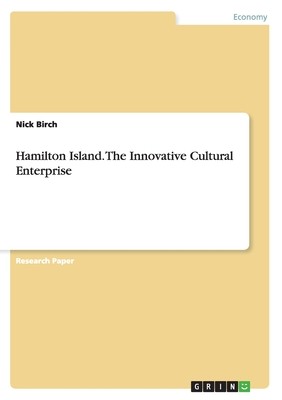
- We will send in 10–14 business days.
- Author: Nick Birch
- Publisher: GRIN Verlag
- Year: 2015
- Pages: 20
- ISBN-10: 3656884099
- ISBN-13: 9783656884095
- Format: 14.8 x 21 x 0.1 cm, softcover
- Language: English
- SAVE -10% with code: EXTRA
Reviews
Description
Research Paper (postgraduate) from the year 2015 in the subject Tourism - Miscellaneous, grade: 1.1, Central Queensland University, course: Cultural Entrepreneurship, language: English, abstract: Globalisation has meant that the offerings of many destinations are increasingly homogenous. Branding provides a way of creating a unique identity through relationship building and emotional appeal, rather than differentiation on the basis of functional qualities. While destination branding draws on principals from product marketing there are some important differences. This is a more obvious requirement in some sectors, such as tourism, where countries develop hospitality industries and infrastructure such as convenient airport facilities. However, such marketing concepts increasingly apply to countries as a whole. Nearly all successful communities can quickly identify their "brand." They draw on their comparative advantages to find ways of encouraging growth by attracting the people, businesses, education service and investment they need. (Hulsbosch, 2011) Hulsbosch (2011) suggests acting and thinking globally as one of his destination branding tips, advising that brand identity and all related promotional activities must appeal across cultural groups. Cultural tourism gives visitors the opportunity to understand and appreciate the essential character of a place and its culture as a whole, including: - History - People and their lifestyle - Cultural diversity - Arts and architecture - Food, wine and other local produce (Foo & Rossetto, 1998, p.63)
EXTRA 10 % discount with code: EXTRA
The promotion ends in 18d.11:18:16
The discount code is valid when purchasing from 10 €. Discounts do not stack.
- Author: Nick Birch
- Publisher: GRIN Verlag
- Year: 2015
- Pages: 20
- ISBN-10: 3656884099
- ISBN-13: 9783656884095
- Format: 14.8 x 21 x 0.1 cm, softcover
- Language: English English
Research Paper (postgraduate) from the year 2015 in the subject Tourism - Miscellaneous, grade: 1.1, Central Queensland University, course: Cultural Entrepreneurship, language: English, abstract: Globalisation has meant that the offerings of many destinations are increasingly homogenous. Branding provides a way of creating a unique identity through relationship building and emotional appeal, rather than differentiation on the basis of functional qualities. While destination branding draws on principals from product marketing there are some important differences. This is a more obvious requirement in some sectors, such as tourism, where countries develop hospitality industries and infrastructure such as convenient airport facilities. However, such marketing concepts increasingly apply to countries as a whole. Nearly all successful communities can quickly identify their "brand." They draw on their comparative advantages to find ways of encouraging growth by attracting the people, businesses, education service and investment they need. (Hulsbosch, 2011) Hulsbosch (2011) suggests acting and thinking globally as one of his destination branding tips, advising that brand identity and all related promotional activities must appeal across cultural groups. Cultural tourism gives visitors the opportunity to understand and appreciate the essential character of a place and its culture as a whole, including: - History - People and their lifestyle - Cultural diversity - Arts and architecture - Food, wine and other local produce (Foo & Rossetto, 1998, p.63)


Reviews